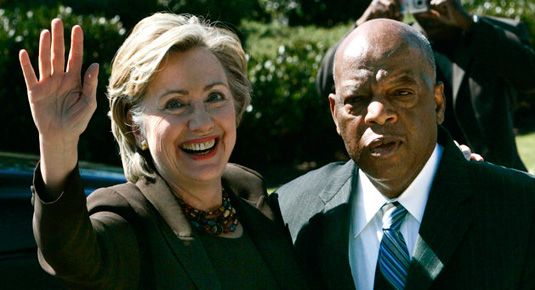
WASHINGTON – Pundits and pollsters across the nation have been examining opinions within the African American community and trying to predict whether Hillary Clinton or Bernie Sanders will capture the bulk of the black vote.
Lee Fang, widely known for his insightful journalism, recently wrote in The Intercept that the endorsement of Clinton by the Congressional Black Caucus Political Action Committee (CBC-PAC) “is being widely interpreted as a sign of her deep support from the African-American community.”
Saturday, observers will have an opportunity to judge the strength of the bond between CBC members supporting Clinton and African American voters in South Carolina. That’s when the state’s Democratic presidential primary is scheduled to take place.
The majority of Democratic voters in South Carolina are black.
It’s probably accurate to surmise that the closer the outcome between Sanders and Clinton, the weaker the CBC’s influence has become.
CBC-PAC’s endorsement of Clinton was announced in a widely covered press conference a few weeks ago.
It immediately elicited dissension.
CBC member Keith Ellison, D-Minn., tweeted “Cong’l Black Caucus (CBC) has NOT endorsed in presidential. Separate CBCPAC endorsed withOUT input from CBC membership, including me.” And then he had a follow-up tweet saying “The point [is] that endorsements should be the product of a fair open process. Didn’t happen.”
CBC-PAC Chair Gregory Meeks, D-N.Y., responded that although 41 out of 46 members of the CBC have endorsed Clinton, “The Congressional Black Caucus does not ever endorse in any race at any time because it is a composite group that can include and does include Republicans as well as Democrats.”
The CBC-PAC, on the other hand, is allowed by law to raise money and support candidates.
The decision to endorse Clinton was made by the 20-member CBC-PAC board, not the Congressional Black Caucus itself. There were two abstentions.
The board consists of seven elected officials, two CBC-PAC staffers and 11 lobbyists, including representatives of Purdue Pharma, Philip Morris, Lorillard Tobacco and Wal-mart.
Rep. Meeks said that “We in the Congressional Black Caucus have to raise money so we can elect folks. But if you look at how the Congressional Black Caucus votes, no one can say that they don’t vote in a very progressive way.”
He went on to explain that although Sanders has caucused with the Democrats and that it has been a “pleasure” to work with him, he has “not gone out to partner with us to elect Democrats.”
Clinton-CBC partnership
On the other hand, both Bill and Hillary Clinton have a decades-long history of hitting campaign trails to elect CBC members.
Also, the Clintons have given millions of dollars to the Democratic National Committee.
The partnership between the Clintons and black legislators goes back to the mid-1980s. Calling themselves “New Democrats” or “The Third Way,” both Bill and Hillary became leaders in the formation of the Democratic Leadership Council (DLC), which believed that the only way to save the Democratic Party in the South was to compromise with Republicans while at the same time creating more opportunities for African Americans to become leaders.
Reverend Jesse Jackson called the DLC “Democrats for the Leisure Class.”
The DLC was firmly against what it called “economic populism,” and also against the South sliding back toward segregation. When Bill Clinton took office as Arkansas’s governor, he held a press conference at the desk once used by former Governor Orval Faubus, a virulent segregationist. Clinton vowed that never again would an Arkansas governor stand in the way of equality for all.
The Clintons rode The Third Way to the White House and President Clinton appointed African Americans to his cabinet.
Michelle Alexander, author of The New Jim Crow, recently wrote in The Nation that “the love affair between black folks and the Clintons has been going on for a long time. It began back in 1992, when Bill Clinton was running for President. He threw on some shades and played the saxophone on The Arsenio Hall Show. … [He belted] out “Lift Every Voice and Sing” in black churches.
“Toni Morrison dubbed him our first black President.”
Alexander points out that “Black voters have been remarkably loyal to the Clintons for more than 25 years. It’s true that we eventually lined up behind Barack Obama in 2008, but it’s a measure of the Clinton allure that Hillary led Obama among black voters until he started winning caucuses and primaries.”
Sanders supporters
Alexander supports Bernie Sanders, as do a significant number of prominent African Americans such as Harry Belafonte, Rep. Ellison, the rapper Killer Mike, author and philosopher Cornell West, former NAACP President Ben Jealous, former SNCC Chair Chuck McDew and Hollywood stars Danny Glover and Spike Lee.
These supporters and others within the black community point to the fact that during the Clinton Administration both Hillary and Bill successfully promoted and passed the Personal Responsibility and Work Opportunity Reconciliation Act of 1996, which dismantled the social safety net for millions of poor people. Moreover, the Clintons championed the 1994 Violent Crime Control and Law Enforcement Act, which created longer mandatory sentences and reclassified less serious crimes as felonies.
Alexander writes, “Clinton presided over the largest increase in federal and state prison inmates of any president in American history.” The inmates then and now are disproportionately black.
Although as a U.S. Representative, Sanders argued vigorously against the crime bill, in the end he voted for it too.
Surveys show that if all voters of color were people under 45, Sanders would win the presidential nomination. Furthermore, his approval rating with voters of color of all ages climbed from 28 percent in July, 2015 to 51 percent this month, according to a Washington Post-ABC News poll.
However, a high “approval” rating doesn’t necessarily indicate a high number of votes.
“Race” and “economics”
“There is nothing about most of Sanders’ major economic and educational proposals which sit at fundamental odds with the political priorities that we know black and Latino voters hold,” writes Janell Ross, a reporter for The Fix who writes about race, gender, immigration and inequality.
Although Sanders talks about racial inequality, Ross writes, “What Sanders has really said and done most reliably since his campaign began in April is make the case for economic and education policies which he insists will narrow or eliminate economic inequality, thereby taking care of non-white America’s ‘real’ problems.”
However, Ross says, by and large people of color facing economic barriers attribute the barriers to the fact that they are people of color.
Furthermore, in her recent stump speeches, without mentioning Sanders, Clinton has been saying “Not everything is about an economic theory, right? … If we broke up the big banks tomorrow would that end racism? … Would that end sexism? … Would that make people feel more welcoming to immigrants overnight?” After each question, Clinton elicits a “no!” from the audience.
Both Clinton and Sanders have recently asked Rev. Al Sharpton for his backing.
In a Politico podcast, Sharpton was asked if he felt either candidate “feels comfortable” talking about race.
Sharpton said that Sanders “has dealt with” his “argument … that, if you close all the big banks and everything is brought down, that still doesn’t make us equal, given the race gap in employment, given the race gap in wealth and property ownership. You’ve got to address race.”
This is especially true, Sharpton said, when campaigning in South Carolina where African Americans are still reeling from the police murder of Walter Scott, an unarmed black man, and from the attack on a black church that left nine people dead.
When the podcast commentator asked Sharpton whether Clinton “gets” race, he said, “I think she’s familiar with it. She worked for Marian Wright Edelman as [Bill] marched for Dr. King, and I think that her husband and his Arkansas background and living more with blacks, they were more ‘accultured.’ But comfort and culture [are] two different things.”
Now that the pundits, pollsters, commentators and politicians have had their say, this Saturday the people of South Carolina will have theirs.
Photo: Civil rights hero, Rep. John Lewis (D-Ga.), is backing Hillary Clinton in her bid for the Democratic Party’s nomination for the presidency. | John Amis/AP

MOST POPULAR TODAY

Zionist organizations leading campaign to stop ceasefire resolutions in D.C. area

High Court essentially bans demonstrations, freedom of assembly in Deep South

U.S. imperialism’s ‘ironclad’ support for Israel increases fascist danger at home


UN warns that Israel is still blocking humanitarian aid to Gaza






Comments